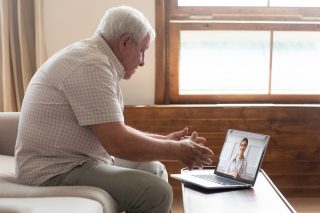With the current outbreak of COVID-19, the CDC is urging older adults to stay home in order to lessen their chances of becoming ill. But we all know that, even in the case of a national emergency, life somehow goes on. Those over 60 should stay home, yes, but what if you need to get groceries? Or go to the pharmacy? What if you think you’re ill and need to see the doctor?
We know there’s a lot of uncertainty swirling right now, but here is what we do know: people and organizations have sprung into action to help the at-risk members of our communities. We’ve compiled a list of information, community resources and tips specifically for older adults and seniors so you can get the support you need during these stressful times.
First things first, here are the CDC’s prevention recommendations:
- Wash your hands often with soap and water for at least 20 seconds especially after you have been in a public place, or after blowing your nose, coughing or sneezing.
- If soap and water are not readily available, use a hand sanitizer that contains at least 60% alcohol. Cover all surfaces of your hands and rub them together until they feel dry.
- Avoid touching your eyes, nose and mouth with unwashed hands.
- Avoid contact with people who are sick.
- Put distance between yourself and other people if COVID-19 is spreading in your community. This is especially important for older adults.
- The CDC recently updated recommendations to include the use of cloth face masks while in public settings where other social distancing measures are difficult to maintain (e.g., grocery stores and pharmacies), especially in areas of significant community-based transmission. Learn more about face coverings from the CDC.
Michigan resources for seniors
If you have questions or concerns about COVID-19, or if you need to know more about resources regarding bills, community services, food assistance, etc. call the State of Michigan’s 211 line for help. Calling 2.1.1 will connect you with nonprofit and government resources in your area to get you the help you need. You can also visit the 211 website here.
The state has also set up a dedicated COVID-19 hotline you can call seven days a week from 8 a.m. to 5 p.m. with any health-related COVID-19 questions: 1.888.535.6136.
To help support Michigan seniors during this time, Michigan is offering increased meal delivery and daily wellness check via phone. Residents over 60 can fill out this form to request meal delivery and/or a daily call to see how you’re doing and if you need any assistance.
Virtual care
Contact your doctor or health insurance company to see if they offer telehealth options, sometimes more commonly called “virtual care.” Virtual care gives you the option to see your doctor or medical professional without going into their office, from the comfort and safety of your own home. In response to the COVID-19 outbreak, Priority Health expanded our existing $0 copay virtual care to all members through April 30. If you get your health insurance through Priority Health, you’re eligible for virtual care without paying a copay.
If you suspect you have COVID-19 symptoms, or if you have a nonemergency health concern, use your virtual care options or call your doctor’s office. Your doctor will determine whether you should be tested for COVID-19.
Prescription and pharmacy needs
Many health plans offer mail-order medication delivery or other methods for members to get their prescriptions without going to the pharmacy. Call your Medicare or other health insurance provider and ask if they offer alternative methods for picking up your prescriptions.
Priority Health members can now have their prescriptions delivered to their home at no additional cost through partnerships with CVS, Walgreen’s, Meijer and other local pharmacies. Learn more here.
Priority Health also offers Medicare members the options to use Express Scripts Home Delivery to have prescriptions delivered directly to your home. Usually you’ll get up to a 90-day supply for the cost of two and a half copays—so it even saves you money versus picking up your medications in store! You can find the form for Express Scripts here.
If you don’t have Priority Health insurance, contact your insurance carrier and ask if they offer prescription mail order.
Shopping
To answer the growing need, many Michigan grocery stores have dedicated shopping hours for seniors and other high-risk individuals. There are also grocery delivery services available, like Shipt and Instacart, as well as some local options. Call your grocery store and ask if they’re offering curbside pickup or other shopping options for those at higher risk. Here are a few grocery chains with hours specifically reserved for higher-risk individuals:
- Costco: Offering special store hours for senior members ages 60 and older and those with physical disabilities. Call your local store for specific hours and days.
- Dollar General: The first hour of operation is reserved for seniors. Call your local store to find out opening times.
- Fresh Thyme: Customers over the age of 60 and customers who may have a compromised immune system, open exclusively for you to shop between 6-8 a.m .on Mondays, Wednesdays and Fridays.
- Kroger: Beginning Monday, March 23, the first shopping hour from 7 – 8 a.m. on Mondays, Wednesdays and Fridays is dedicated to senior shoppers, expectant mothers, first responders and those with compromised immune systems.
- Meijer: Stores and pharmacies will provide dedicated shopping times for senior citizens and customers with chronic health conditions on Tuesdays and Thursdays from 7 a.m. to 8 a.m.
- SpartanNash stores (including D&W Fresh Fare, Family Fare, Martin’s Super Market and more): Reserved hours every Tuesday and Thursday from 7 a.m. to 9 a.m. for at-risk guests, including older adults, pregnant women and immunocompromised individuals.
- Target: First hour of shopping on Wednesdays is dedicated to vulnerable customers.
- Trader Joe’s: Senior shopping every day between 9AM and 10AM. Crew members will maintain an additional line outside the front door for senior customers to ensure customers in need have an expedited entrance to the store.
- Walmart: Through April 28, stores open one hour early on Tuesdays for customers 60 and older to shop.
- Whole Foods Market: Customers who are 60 and older can shop one hour before stores open to the public. Call your local store for details.
Mental health
This is a tough time for everyone and there’s no shame in admitting you’re struggling to cope. Humans are social creatures and distancing ourselves like we’ve been asked to do can make us feel isolated and have a negative effect on mental health, so try to take care of your mental wellbeing as well as your physical wellbeing during this time (and try these ideas to boost your mental health). But if you find you’re still not feeling well mentally, don’t hesitate to reach out for help.
Priority Health members can call the behavioral health line anytime, 24/7. Just call the number on the back of your member ID card and get assistance for things like:
- Feelings of emotional distress
- Struggling with depression or sad thoughts
- Would like help finding the right person to talk to
- Need more information about your health plan’s mental health coverage
Priority Health has also partnered with a digital health specialist to offer free access to mental wellness resources specifically focused on the COVID-19 pandemic. Learn more here.
Staying active

Exercise is not only good for your body, it’s good for your mind, as well. Long periods of social distancing can have a negative effect on mental health, which is why it’s important to get in some endorphin-boosting activity during this time.
Looking for ways to stay active while you’re hunkering down? Walking is a great way to get fresh air and exercise while still keeping your distance from others. You can also find ideas in our articles about low-impact workouts, or check out the SilverSneakers Facebook page, where they’re hosting virtual senior-friendly exercise classes.
Staying informed
Know how to find the most accurate and current health information and don’t rely on social media or word of mouth for your news—that’s how misinformation spreads. Instead, check the CDC’s website for the most current information regarding COVID-19. The State of Michigan created a dedicated webpage for the latest COVID-19 news and recommendations.
While it’s good to stay informed, don’t get sucked into a cycle of neverending news and information. It might be a good idea to turn off the 24/7 news stations and check in just once or twice a day for important updates, just to keep yourself from becoming overwhelmed.
We’ll update this article as new resources become available. We know times are tough and there’s still a lot that’s unknown but remember: ask for help when you need it, help others when and if you’re able, and we’ll all get through this together.


